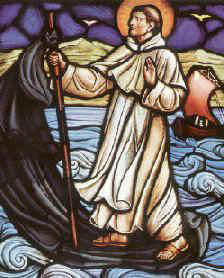|
To work for the proper implementation of canon law is to play an extraordinarily constructive role in continuing the redemptive mission of Christ. Pope John Paul II |
|
|
|
|
Resolution 1152 x 864 |
Updated 12 jan 2013 |
Review of Tadie & Macdonald, eds., Permanent Things (Eerdmans, 1995) 309 pp. |
|
Edward Peters, Review of Tadie & Madonald, eds., Permanent Things (1995), in Fellowship of Catholic Scholars Quarterly 19/2 (Mar, 1996) 42.
|
Few of us have the leisure or the discipline to read widely outside of our fields. What time we can bring to such pursuits, then, needs to be as focused as possible. Assuming one's broad familiarity with Chesterton, Lewis, and Waugh (though Sayers, Eliot, and Dickens would help) and assuming the kind of working acquaintance with the principal points of Christian thought that used to mark the liberally educated man and woman, I can think of few better companions for one's precious free hours in 1996 than Tadie and Macdonald's "Permanent Things."
Eighteen multi-disciplinary essays by scholars of the calibre of Russell Kirk, Marion Montgomery, Thomas Howard, Peter Kreeft, and Alzina Stone Dale (omitting, even thus, Gregory Wolfe, Barbara Reynolds, and Kent Hill among others) come together in this beautifully bound and printed book. I cannot list the topics contained herein without either reproducing the entire table of contents or doing serious injustice to matters omitted, but I can say this: like the authors they examine, the essayists in "Permanent Things" bridge the worlds of literature, history, politics, and theology, and they do it with admirable clarity and efficiency. Seldom is writing, anymore, so fruitful and fun.
The occasion for these essays was a tri-annual humanities conference sponsored by the Intercollegiate Studies Institute, Seattle University, and Seattle Pacific University, a fact that lends consistency to the printed essays and results in a book which comes close to approaching the personalized ambiance of mature, informed discussion which Tadie and Macdonald have created for conference participants over the last 10 years.
The ecumenical character of the topics and presenters in "Permanent Things" (and its 1989 predecessor, The Riddle of Joy, also from Eerdmans) is noteworthy. Not a religious conference, and certainly not a contrived exercise in see-how-much-we-have-incommonism, the commitment to permanent things like faith and honor which animated each minute of the conference and which marks every page of this work is, I think, one the best signs that the one Truth we all cling to will, in the end, triumph.
How highly do I value this book? Well, the publisher sent me a free copy to review. After I read it, I went out and bought another one to give to a lawyer friend who already has too much to read. And we're both happy I did.
|





